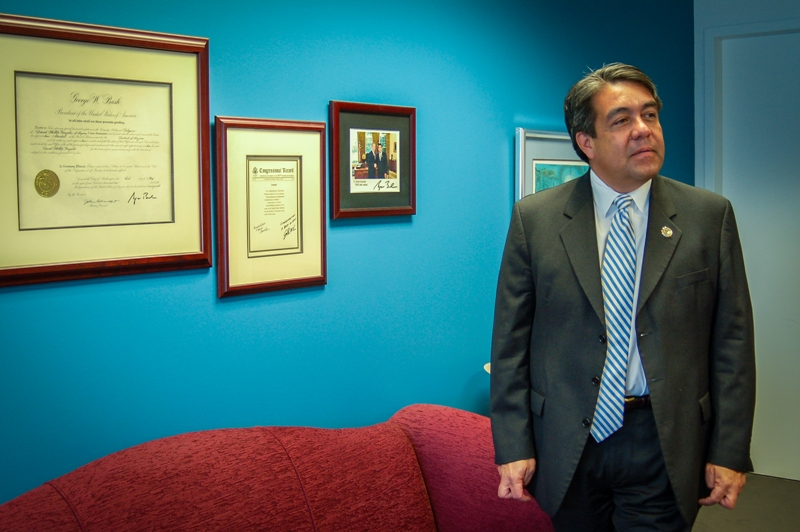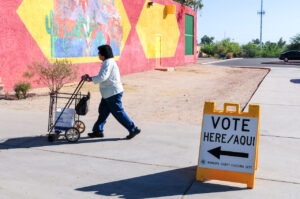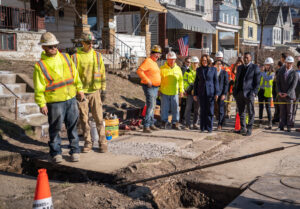David Gonzales, can you give us a background about yourself?
I was born in Flagstaff, Arizona in 1954. I was one of seven children; both sets of grandparents were there. When I was eleven, my mother died of cancer. All of the kids were scattered to the family, and I was lucky that I grew up in a town with a large extended family. I was raised by my grandparents, which was a blessing, because they believed in the old traditional values of hard work. At the time, I was young and I thought –Oh, you viejitos– you don’t know what you’re talking about. Then when you get older, you realize how wise they were. I remember my grandfather used to say: “Honest sweat has no odor.” I used to laugh. Later I realized he was right. He always pushed education, something that he didn’t have. I think he went [up] to the third grade, but he would talk about the value of education. He would also say an old Mexican proverb, “If you grow up thinking you’re a flowerpot, you’ll never get off the porch.” When you’re a child you don’t understand, but one day it makes sense.
How did you get involved in law enforcement?
I was head of the “Gang Task Force,” a very interesting job, one I took very seriously, because at the time, and probably it’s still the same, 66 percent of the gangs in Arizona were [composed of] Latinos. And that used to just frustrate me; that my people got so involved in gang culture and could not get out of it. [Many of the gang members were] second and third generation gangs; [that] could not breakout of that cycle, and it hasn’t gotten any better. I was doing my best to protect the community, and also there were people who needed to go to jail. There were other kids that didn’t belong in gangs, but had no other choice; those are the ones we were trying to steer away from gangs. It was very difficult for them, because they were in the cycle, [and] had the mindset of “This is my life and it’s not going to get any better, I was born to die and to do this.” I think as a people, that is one of our biggest faults. [We need] to break through those barriers. I graduated from Flagstaff High School. I received an academic scholarship to attend Northern Arizona University. It was a partial scholarship. I didn’t have any other money; I had to work. I was hired as a policeman. I was a Deputy Sheriff at 19 years old. I was the youngest policeman in the country at 19 and a Latino. The Sheriff, Joe Richards ‒he’s retired now‒ gave me my first break. He was a guy who didn’t care if you were Black or Latino. I think he thought that if you had some promise and were hard-working, he’d give you a break. Being a policeman at 19 ‒they’ve changed the law since then [now] you have to be 21‒, I couldn’t buy bullets for my gun. I had somebody buy them for me. I had to go to my sergeant: “Sergeant, can you buy me some bullets?” He’d go and buy bullets for my gun. I was old enough to be a policeman, but not old enough to buy bullets; it was an ironic situation. I was a Deputy Sheriff for two years and was going to school. When I was growing up in Flagstaff, I used to see the Highway Patrols, and they always had the big fancy cars and that “Smokey the Bear” hat. I was so impressed by them; I thought they commanded respect and I wanted to be a Highway Patrolman. I joined the DPS (Department of Public Safety) and was sent to Tucson, where I worked as a Highway Patrolman for two years. This was in the late 1970s, during a time when drug smuggling out of Mexico was just out of control. Arizona was home to some of the traditional drug-smuggling families who lived in Tucson. There was a big push for narcotics, and at that time I was 23 years old, but I looked like I was 16. People who looked young were needed to work undercover, so they came to me and asked if I would like to transfer to narcotics. I thought it would be interesting, so I transferred. I worked as an officer, then sergeant in an undercover squad where our job was to infiltrate drug smuggling organizations. During that time, I met my wife. She had just graduated from law school at the University of Arizona. She was offered a job with a big law firm in Phoenix, so we moved. Then, while I was with DPS, I began moving up the ranks. I was promoted to Lieutenant, Captain, Commander, and eventually, Head of Organized Crime Bureau Gang Units. I spent a year in Washington D.C., with the FBI, doing gang training for them. DPS sent me to Harvard University, John F. Kennedy School of Government – Executives in State and Local Government Program for management school. When President Bush was elected, I applied for the job of U.S. Marshal. My appointment was recommended by Arizona Senators John McCain and Jon Kyl. The U.S. Marshals Service is the oldest federal law enforcement [agency] in the country. When this country was first formed, our Founding Fathers didn’t know how to really run a country; they were brilliant people but were unfamiliar with certain areas. One of these areas was: “How do we settle disputes among the states?” As you can imagine, at that time, there were all kinds of disputes over taxes, crimes and so on. Therefore, the first Act* of Congress was to establish the court system, so the federal judicial court was established and as part of that Act came the creation of a police force, which was the United States Marshals Service. President Washington appointed the first 13 U.S. Marshals, and that tradition is still carried out today, where the president appoints the Head of the Marshals Service for the Districts. As U.S. Marshals, we are probably the busiest federal agency in the country, because we are responsible for arresting federal fugitives, managing the Witness Protection Program, maintaining custody of pretrial prisoners, etc. We have the broadest powers of any federal agency in the United States. (*The Act Congress passed was “The United States Judiciary Act of 1789 – 1 Stat. 73. A landmark statute adopted on September 24, 1789 in the first session of the First United States Congress. It established the U.S. federal judiciary. The Act created the office of Attorney General, and also provided for the appointment of a marshal, one or more deputy marshals, and a district attorney for each judicial district).
Does Arizona, being a border state, present different challenges for you?
Yes. What makes Arizona challenging for the Marshals Service is our border with Mexico, and immigration issues. One of those challenges is finding bed space for the prisoners. I am responsible for all of the prisoners who are arrested, and I have to maintain them in house (prison). In Arizona, our federal prisoners are housed primarily at a private prison in Florence, Arizona-CCA. I have 3800 beds, but I have 5000 prisoners. I send the private company over eight million dollars a month to house federal prisoners.
Are these all immigrant prisoners?
No, the majority of them are, but the rest aren’t. As you can imagine, federal crimes, drug smugglers, bank robbers, white collar criminals, every aspect of society is there. The majority are immigration charges. I also have to contract with the county sheriff’s to house prisoners for us. The system is bulging at the seams, and our whole judicial system is beginning to crack. We’re going at this immigration debate saying “arrest all these people!”, but we can’t even handle it; the system cannot handle it. Then, there are a lot of medical issues dealing with prisoners also that cost taxpayers another two million dollars a month.
So these are some of the challenges you face?
Yes, and those only have to do with the prisoners. Now, one of the major functions of the Marshals Service is to arrest major fugitives worldwide. I have Deputy Marshals everyday who are out looking for fugitives who are hiding out, trying to avoid charges, and that’s really important to us because if you’re a victim of crime, it’s necessary that you have closure.
Why don’t we hear too much about U.S. Marshals in mainstream media like we do of other law enforcement agencies?
You’re right, you don’t. We are a small agency, and our job is to protect the courts, judges, and arrest federal fugitives, and sometimes those types of things are not as sexy to the media.
What has been the most satisfying aspect of your job?
When I was a young policeman I would say, “When I’m a sergeant, I’m going to make changes.” When I was a sergeant, I would say: “When I’m a lieutenant, I’m going to make things better for the community and the organization.” And being in this position as U.S. Marshal, you have the control and influence to make things better within my district, our headquarters in Washington, and also, in our community. Changes can range from little things to big things. I would see Hispanics I worked with sometimes put the blinders on to promotion because they loved what they were doing, which was important. But if you want to make change and have an influence, you need to get promoted, so that you can effect that change.
How have people responded to a Latino U.S. Marshal?
I want to tell you a story. I was giving a speech at a big convention, here locally, and there were about 400 people in attendance. I was off to the side preparing to give my speech, and this woman from the crowd comes up to me and says: “Sir, we need another table set up over here.” I answered: “I don’t work here.” She said: “Oh, okay.” Then, they introduced me, and they did this big flowery introduction, you know how they do it, and she sees me, and her eyes got this big. It was interesting because she assumed, since I was the only Hispanic in the room, I must be setting up the tables. I know I’m up on a tangent here, but it was really, really interesting that there were so many people there, yet she made a beeline for me to set up the table; she just assumed I was part of the staff. I have another one. I was at a small town in Arizona, and I made a courtesy visit to the Chief of Police. We were talking about the Marshals Service and we got on the topic of badges. I was explaining to him that the Head of the Office has a gold badge, and the Deputy Marshals have a silver one. That’s how you know who was appointed by the president and is the head of the office, so he looks at me and asks, “So, how come you have a gold badge?” He could not understand how a Latino would have a gold badge, so I answered, “Because I’m the U.S. Marshal.”
David Gonzales is Arizona’s third Latino U.S. Marshal. Prior to him, Alfred Madrid held this position, and from 1969 to 1976, Pat A. Madrid held the office.
Visit the U.S Marshal, District of Arizona website
© 2006 – 2023, Yolie Hernandez. All rights reserved.





